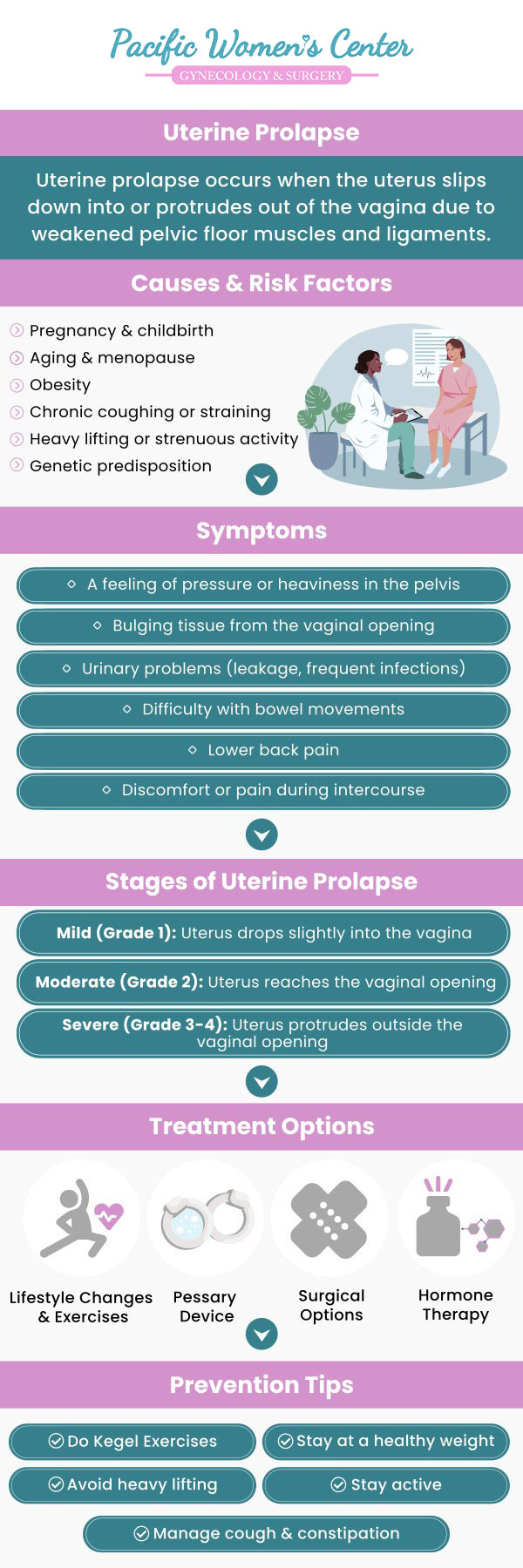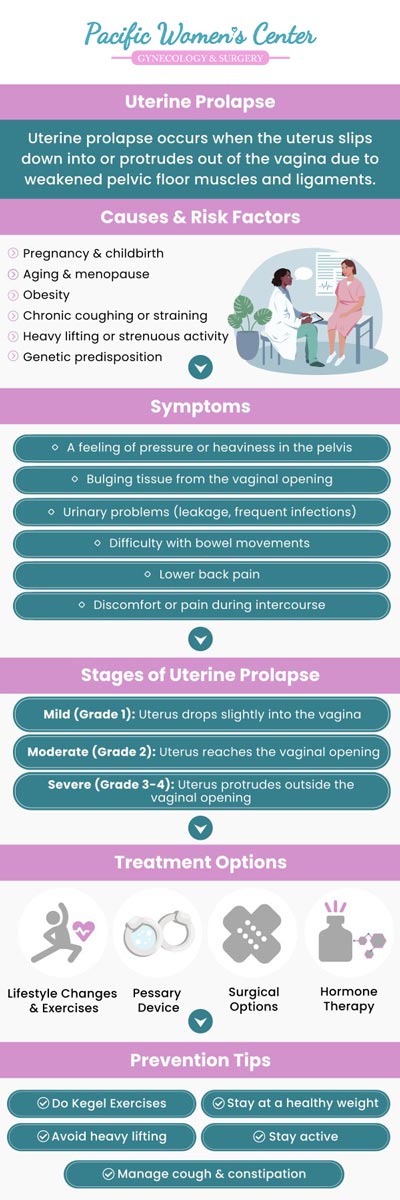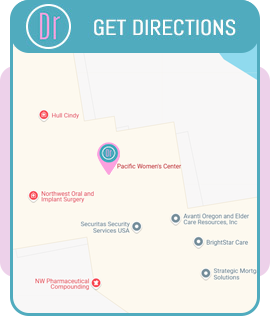Uterine Prolapse Treatment Specialist in Eugene, OR
Uterine prolapse treatment aims to restore the pelvic organs to their proper position, improving comfort and function. This condition can cause symptoms such as urinary incontinence, pelvic pressure, and vaginal bulging. Dr. Richard Beyerlein MD, CPI, FACOG, and Tamara A. Stenshoel, MD, FACOG, provide specialized treatment options for uterine prolapse at Pacific Women’s Center, using advanced techniques to address your specific needs. For more information, Contact us or schedule an appointment online. We are conveniently located at 911 Country Club Rd. Suite 222, Eugene, OR 97401.




Table of Contents:
What is uterine prolapse?
What causes uterine prolapse?
What does a prolapsed uterus feel like?
What are the symptoms of uterine prolapse?
At Pacific Women’s Center, we understand that conditions like uterine prolapse can significantly impact your daily life and well-being. Uterine prolapse occurs when the uterus descends from its normal position into or outside of the vaginal canal due to weakened or stretched pelvic floor muscles and ligaments. This condition can range from mild to severe, and it is often the result of factors such as childbirth (especially after multiple or difficult vaginal deliveries), aging, menopause, chronic coughing, obesity, or activities that increase pressure on the pelvic floor.
Symptoms of uterine prolapse may include a sensation of heaviness or pulling in the pelvis, tissue protruding from the vagina, urinary difficulties (such as incontinence or retention), trouble with bowel movements, and discomfort during intercourse. In some cases, symptoms may be subtle or not noticeable at all.
At Pacific Women’s Center, our experienced women’s health specialists provide comprehensive evaluation and personalized care for uterine prolapse. Diagnosis is typically made through a gentle pelvic examination during your visit. Our team will discuss the most appropriate treatment options based on the severity of your symptoms and your individual needs. Treatment may include:
• Pelvic floor exercises to strengthen supportive muscles,
• Pessary fitting, a device inserted into the vagina to help support the uterus,
• Minimally invasive or surgical procedures to repair or support pelvic organs if necessary.
We also provide guidance on lifestyle modifications, such as maintaining a healthy weight, avoiding heavy lifting, and incorporating pelvic floor strengthening exercises, to help prevent or manage uterine prolapse.
At Pacific Women’s Center, we frequently care for women experiencing uterine prolapse—a condition where the uterus descends into or protrudes out of the vaginal canal due to weakened pelvic muscles and ligaments. This can occur for a variety of reasons. The most common cause is childbirth, particularly after multiple vaginal deliveries or the birth of large babies, which can put significant strain on the pelvic floor. Aging and the natural decline in estrogen following menopause can also weaken these supportive tissues, making prolapse more likely.
Other risk factors include chronic conditions that increase pressure in the abdomen, such as persistent coughing, obesity, or frequent heavy lifting. Some women may be predisposed due to connective tissue disorders or genetic factors, and a history of pelvic surgery can also contribute.
Our experienced team understands how troubling and disruptive uterine prolapse can be. We offer comprehensive evaluations and a range of treatment options—from pelvic floor therapy to surgical solutions—tailored to meet each woman’s unique needs. If you’re experiencing symptoms of uterine prolapse, such as pelvic pressure or a bulge in the vaginal area, we encourage you to schedule a confidential consultation with our compassionate providers. We’re here to help you regain comfort and quality of life.
At Pacific Women’s Center, we understand how distressing and disruptive a prolapsed uterus can be to your daily life. This condition can cause a variety of sensations and symptoms, which often depend on the severity of the prolapse. Many women describe feeling heaviness, pressure, or a pulling sensation in the pelvic area—symptoms that may worsen as the day progresses or after long periods of standing. You might also notice a bulge or something protruding from the vagina, especially when wiping after using the bathroom or during physical activity.
Other common symptoms include discomfort during intercourse, lower back pain, and urinary issues such as difficulty starting urination, a sense of incomplete emptying, or increased urgency and frequency. Bowel symptoms, like constipation or feeling as if you cannot fully empty your bowels, can also occur. Some women report a sensation as though something is “falling out” of the vagina, or feel as if they are sitting on a small ball.
These symptoms often become more noticeable with activities that increase pressure in the abdomen, such as lifting, coughing, or straining. If you are experiencing any of these symptoms, it is important to seek professional evaluation and care.
Our experienced providers offer compassionate, individualized care for women dealing with uterine prolapse and other pelvic floor concerns. We are here to help you find relief, restore your comfort, and improve your quality of life.
When the vital support system of pelvic floor muscles and ligaments weakens, the uterus can shift downward from its natural position, a condition known as uterine prolapse. At Pacific Women’s Center, we provide a safe and confidential environment to discuss your pelvic health. Understanding the signs is the crucial first step toward accessing the effective, compassionate care you deserve.
The experience of uterine prolapse varies. For some, it may be a persistent sensation of fullness or a dragging feeling in the pelvis, often becoming more noticeable after being on your feet for a long time. For others, the most prominent sign is a physical bulge of tissue at the vaginal opening, which can become more apparent during moments of strain like coughing or lifting heavy objects.
Discomfort during sexual intercourse is another possible symptom. Urinary issues, such as difficulty starting urination, a frequent urge to urinate, or urinary incontinence, are also common. In some cases, women may have trouble with bowel movements, including constipation or a sensation of incomplete emptying. Lower back pain is sometimes reported, as well as a sense of something “falling out” of the vagina. These symptoms often become more noticeable with physical activity or as the condition progresses.
We encourage you not to ignore these signs. Early in the condition, symptoms may be mild or absent, but they can worsen over time if left untreated. If you’re experiencing any of these symptoms, our compassionate team is here to help. We offer personalized evaluation, management, and treatment options tailored to your needs.
Don’t let pelvic discomfort impact your quality of life. Contact Pacific Women’s Center today to schedule an appointment and take the first step toward improved pelvic health. For more information, contact us or schedule an appointment online. We are conveniently located at 911 Country Club Rd, Suite 222, Eugene, OR 97401. We serve patients from Eugene OR, Springfield OR, Creswell OR, Lowell OR, Cottage Grove OR, Coburg OR, Junction City OR and the surrounding areas.

ADDITIONAL SERVICES YOU MAY NEED
❱ Abdominal Hysterectomy
❱ Bladder Lift Surgeon Q&A
❱ Cervical Cone Biopsy
❱ Colposcopy
❱ Endometrial Ablation
❱ Endometrial Biopsy
❱ Female Sexual Dysfunction
❱ Gynecological Surgery
❱ Gynecology
❱ Hormone Therapy
❱ Vaginal Hysterectomy
❱ Endometriosis Diagnosis & Care



